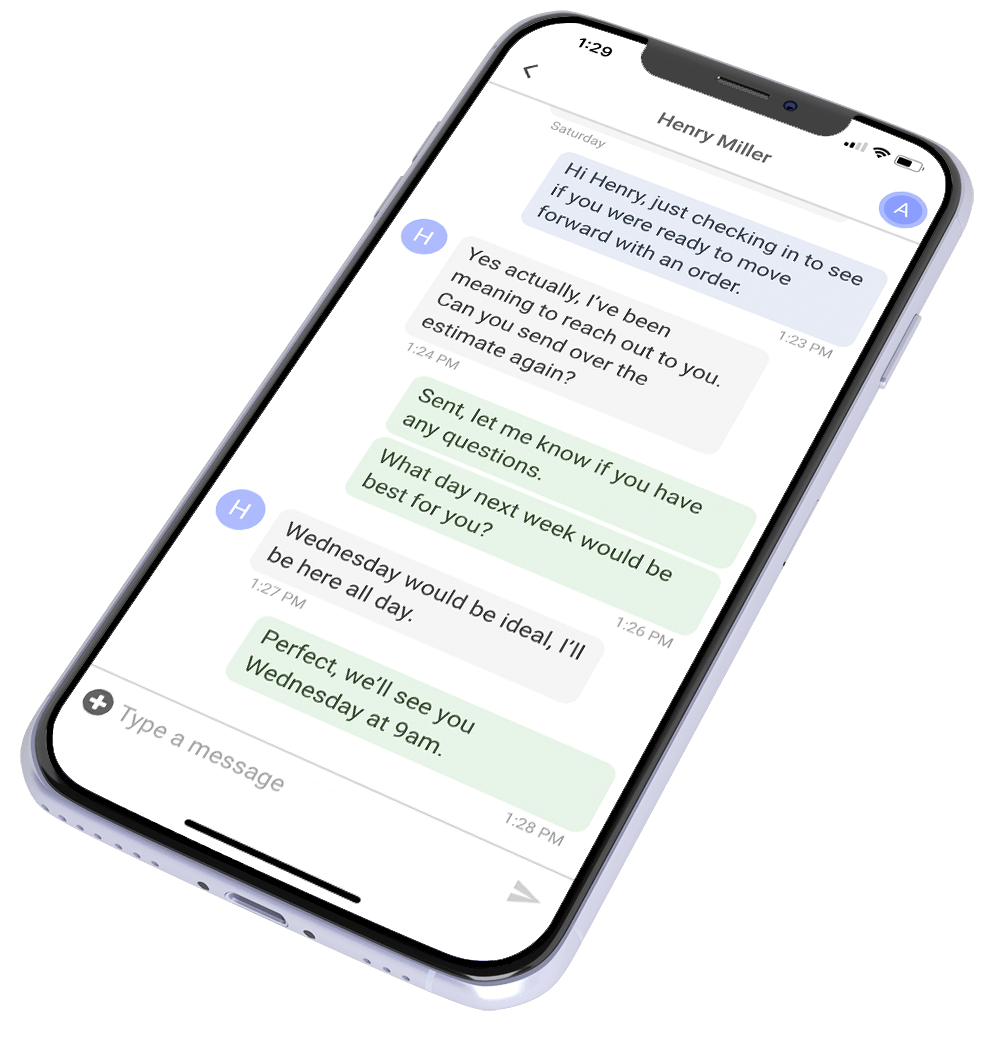Find what makes great roofing CRMs and how some of the biggest names in the industry stack up.
Did you know that 75% of CRM implementations fail?
That’s right. The vast majority of businesses that try to use a CRM can’t make it work. They spend countless hours and sometimes thousands of dollars on technology with nothing to show for it.
Yet it feels like new roofing CRMs pop up each day. And each one claims to be the best roofing CRM. How can you tell which one is best for your roofing business? How can you know which ones will waste your money and which ones won’t?
The goal of this article is to give you some clarity in the roofing CRM department. We’re going to define what makes a great roofing CRM. We’re also going to compare the top roofing CRMs to see if one can claim the title of best roofing CRM!

The Best Roofing CRMs
One quick thing before you dive in. You’re reading this on the ProLine blog. ProLine is a CRM. We’ll be listing out the strengths and weaknesses of our competitors. If you’re guard just went up, we don’t blame you.
But here’s the thing. We believe that we don’t need to tear down our competitors and put our thumbs on the scale to win your confidence. A simple demo would do that. And we think there’s far more to be gained by telling you the truth in an even-handed way than by slandering our competitors. So we’ll do our best to share what we know, good and bad, in a non-biased way. We think it’s best for you and for us!
Oh, and if you need a little more context about CRMs, scroll past the rankings. You’ll find a deep dive into what a CRM actually is, how a CRM works, and more.
ACCULYNX
The original gangster roofing CRMs. Acculynx has been around since 2008, making it the oldest roofing-specific CRM on this list. So it’s no wonder they’ve got a great market stronghold with tons and tons of features. And their integrations are downright impressive. Also, their logo is just cool.
That said, there are pretty consistent complaints that roofers level at Acculynx.
First off, Acculynx is a rigid system. It’s tough to customize just anything inside of Acculynx. Plus, they’ll charge you to add on features. So unless Acculynx works for your business without any changes, it might be a poor fit for your business.
Also, there have been accusations that they hold user data hostage. It’s a serious claim by Dmitiry Lipinskiy from Roofing Insights. You can hear all his complaints in this video. He also goes in on Contractors Cloud. That said, Acculynx officially denies data hostage-taking on their website.
And it’s worth noting that Acculynx is a closed system. It makes sense that it would be tough to get data out of Acculynx that works well in another CRM. Just playing devil’s advocate here. The takeaway is that Acculynx is a big name in the industry, other big names have raised issues with them, and you shouldn’t go in blind!
Pros
- Clean interface
- Supplier integrations
- Lots of available features
- Been around for a while
Cons
- Rigid system
- Expensive add ons
- Alleged data hostage-taking
JobNimbus
This is the other big competitor in the roofing CRM space. And honestly? It’s a pretty solid roofing CRM. There’s a reason big names like Dmitiry Lipinskiy support it. It covers most bases pretty well.
You get internal team communication. It’s more customizable than most other CRMs. You get a pipeline view of projects. Plus, they recently acquired SumoQuote. Every JobNimbus user reading this will probably get full access to SumoQuote inside their CRM within the next 24 months. Not too shabby of a deal!
In short, it’s solid.
With Jobnimbus, the devil tends to be in the details. Reviews tend to highlight a few things here and there that don’t work as well as roofers would like.
For instance, integrations can be finicky. The same goes for the automations and their mobile app. And many reviews reference the steep learning curve.
Could you do better than JobNimbus? Based on your business, perhaps. But it’s an all-around solid choice for a roofing CRM.
Pros:
- In-app texting
- Customizable
- Jack of All Trades
Cons:
- Automations need work
- Syncs and integrations need work
- Steep Learning Curve
Leap/JobProgress
Just to clarify some confusion, Leap is a software company that purchased roofing CRM JobProgress a few years back.
First off, Leap comes with a low price tag. You can start on their Team plan with a single user for $297/mo. They have tons of project management and estimating features. And overall, their users seem to like the simple interface.
That said, it seems like they focus on everything but communication. Sure, you can text in the app. But it’s not clear if it goes beyond that basic functionality.
To get those boosted features, you have to get Leap SalesPro. It’s more expensive than their CRM, which can really add to the cost of Leap.
Plus, there are some customer service complaints. Nothing dramatic, just some spotty service.
Pros:
- Robust features
- The mobile app seems pretty darn good
- Price is solid
Cons:
- Requires two tools to get full features
- Customer service seems spotty
- Some functionality issues
- Lacks topline communication features
Roofr
The folks at Roofr know what they’re good at, and that’s estimating. Seriously, you can get aerial measurements for $10. Upgrading to the CRM is just $89/mo. Beyond that, they cover the whole sales process, at least in part. But with Roofr, their not-so-secret sauce is their measurements. So if you’re looking for amazing measurement software with a CRM tagged on, this is the way to go.
That said, unique aerial measurement tools offered by the CRM rather than integrated are a nice-to-have and not a must-have for a CRM. And with Roofr, it seems like you get a robust nice-to-have feature set while must-haves range from good to okay. The unfortunate part about Roofr is that they just don’t have a mobile app…so for those times when you can’t be at a computer, you’ll have to settle with using your phone browser to pull it up and use. And at least for now, they have tons of features under development. But you’ve got to give them props for knowing what they’re good at. They market the crap out of their measurements and the instant estimator!
Pros:
- Excellent quotes for residential and smaller jobs
- Cost-effective
- Good customer service
Cons:
- Seems to have problems with larger jobs
- Little emphasis on communication
- No mobile app
- Missing features
iRoofing
Like Roofr, iRoofing leans heavily into estimating and quoting. And they do a pretty good job at it! You can measure roofs from your iPad. Plus, their Roofing Visualizer is an awesome feature. But it doesn’t seem to have solid pipeline management or communication tools. Again, it’s more like a quoting tool with a CRM thrown in as an afterthought.
And according to Grand Roofing, the greatest roofing channel of all time, iRoofing isn’t cloud-based. Data on your iPad is stuck on your iPad. That’s a pretty significant limitation.
So if you want great estimating and quoting, iRoofing is a solid choice. But you might run into limitations beyond that.
Pros:
- Leans heavily into estimating and quoting
Cons:
- More like a measurement tool with a CRM thrown in
- Not cloud-based, meaning you can lose your data.
ProLine
Oh hey, that’s us! ProLine is a communication-first CRM for roofers. It’s built to make closing sales as easy as humanly possible. That’s why ProLine automatically sends text messages and emails to leads and customers based on your sales process. You get to customize what texts and emails get sent and when.
Plus, you get business phone numbers for your sales team. It’s a bit like using your own cell phone. You can text and call from that number, and all of the communication gets saved in your CRM.
That’s what sets us apart in terms of features. Our communication features help our users close new sales fast. Some have gotten sales as soon as 12 hours after toggling on the automations.
That said, ProLine isn’t perfect. It’s under construction, so it’s still missing some of those nice-to-have features. You won’t get sexy aerial measurements from ProLine…although we do have an EagleView Integration where you can order those from within ProLine if you want.
Our app load times are longer than we’d like them to be sometimes. And it’s $397/mo to start off with and $100 per additional seat. Do you get what you pay for? We think so. Just a few extra sales can cover the cost of ProLine for years to come. But it’s worth noting upfront.
If you need a CRM that, you know, manages customer relationships, book a demo and check it out!
Pros:
- Communication focused
- Helps close more sales for less work
- Awesome mobile app
- Text and call from your CRM
- Automate internal process and outbound communication
Cons:
- Still adding features
- Pricier than some competitors
OH, and you can get started with ProLine for free. No, this isn’t a free trial. It’s a full functioning FREE roofing CRM. Check it out!
ServiceTitan
First off, ServiceTitan isn’t really a roofing CRM. It serves all kinds of contractors, including roofers.
ServiceTitan is an analytical CRM. You get all kinds of data from calendars, reports, reminders, and more. If you want a 30,000-foot view of your business, this is the CRM for you. Heck, if you need a 500,000-foot view of your business, ServiceTitan can do that, too!
Is it complex? You bet. But their customer service helps you every step of the way. One review claims that ServiceTitan flew out specialists to help him set up the CRM for their business.
That said, ServiceTitan can get expensive fast. That same review says ServiceTitan is “unbelievably expensive to a majority of the market.” Smaller business might struggle to buy the bill.
So if you’re a big roofing company and you want only the best, or you do tons of roof servicing, offer subscription roof maintenance, or do 20 other trades under the same roof, ServiceTitan is a great option. If not, you’ll probably want to look at a more affordable roofing-specific CRM.
Pros:
- Constant updates and improvements
- Mobile app
- Robust analytics
Cons:
- Very expensive
- Not roofing specific
RoofLink
Truth be told, RoofLink is the only other roofing CRM that feels like it was made by actual roofers. Just check out this product overview with co-founder Jake Brydon. That guy is the real deal, the genuine article.
That’s probably why RoofLink is so simple. It’s got almost everything an insurance-based roofer needs in one place. It’s easy to customize. And the pricing is dead simple.
That said, the interface isn’t as polished as other CRMs. And while they have basic CRM features like stages, it doesn’t seem like they have detailed communication histories. Plus, it’s not clear if you can communicate via rep-level SMS and Email with leads from inside the CRM.
Pros:
- Customizable
- Reasonable price
- Great customer support
- Weather map
- Some automation
Cons:
- Clunky interface
- Few communication features
What is a CRM?
It’s easy to get overwhelmed by roofing CRM features pages. Most CRMs claim to do everything. They want to be the only software your roofing business needs.
But at their core, all roofing CRMs have one job. They’re Customer Relationship Managers. They help you manage customer relationships. Plain and simple.
“… The CRM is only reflection of your company processes. Do you know your process from the moment your prospects contact you initially to the moment you collect final payment? If not that’s where you should start: the white board.”
— Dmitry Lipinskiy
Over the years, a few different types of CRMs have appeared.
There are Operational CRMs. They make the daily tasks of managing customer relationships easier.
There are Collaborative CRMs. They give teams an easy-to-access platform for nurturing leads.
There are Analytical CRMs. They help you gather information on customers and your sales process.
We’ve covered these three types of CRMs in detail. It’s enough to say that most roofing CRMs are operational CRMs. The best roofing CRMs, though, combine elements of all three.
Speaking of which…
Must-Have Features for the Best Roofing CRM
These are the heavy-hitting features that make or break a roofing CRM. Without these core features, you don’t really have a CRM. Sure, you might have useful software. It’s just not a CRM.
Tracking Communication Easily and Automatically
Communication is the heart of sales. You can’t manage a customer relationship if you don’t know what’s been said. That’s why the best roofing CRMs track every interaction with ease. Emails, calls, texts – all logged automatically. Your team stays in sync, ensuring smooth, informed chats with customers.
A critical subsection of communication is automation. CRMs should automatically send the core communications of your sales process. They should send welcome emails, book inspections, and share quotes. Technically you can outsource this to another tool. But we’ve found that integrating automations from other software into a CRM is a huge headache. Automatic communication is a must for a roofing CRM.
Organizing Your Sales Process into Stages
A killer roofing CRM breaks your sales process into clear, manageable stages. You know exactly where each lead stands, from first contact to sealing the deal. By slicing the sales journey into stages, you spot snags and fine-tune your approach. No lead slips through the cracks, boosting your chances of turning prospects into loyal customers. It’s like having a GPS for your sales process.
Robust Reporting
Want to make smart moves? You need solid data. A top roofing CRM lets you track sales, monitor customer interactions, and watch project progress. Reports show what works and what needs tweaking. Custom reports help you zero in on what matters most, helping you make savvy choices.
User-Friendly Interface
A CRM must be easy to use. The best ones have layouts that are a breeze to navigate. Your team finds tools and info fast, without any fuss. A simple interface means everyone uses it, getting the most out of the software. No steep learning curve here. Your team should dive in and run with it from day one.
Customer Service
Last but not least, customer service. Stuff goes wrong. It’s a fact of life. When it does, you want support that’s got your back. Quick responses, real solutions. Not some bot or endless hold music. Good service makes all the difference.
Again, these are the bare bones of managing customer relationships. If a CRM doesn’t have these tools, it’s not actually a CRM. It could be darn useful. It could make you boatloads of money. It’s just not a CRM.
That’s a perfect transition into the next section…
Nice to Have Features
Alright, let’s talk about the bells and whistles. These are quality-of-life features. Technically, you could have different tools to handle each of these features. But having them inside your CRM makes life far easier.
Quotes
First up, quotes. Picture this: you’re at a job site, chatting with a customer. They want a quote, pronto. A good CRM lets you whip up a quote on the spot. No more running back to the office. No more delays. Quick quotes win jobs. It’s as simple as that.
Calendar
Next, the calendar. A roofing CRM with a built-in calendar keeps your schedule in check. Missed appointments? Never again. You can see your week at a glance. Juggle jobs without dropping the ball. And if you’re an admin, a good CRM lets you manage your whole team’s schedule.
Mobile App
Then there’s the mobile app. Roofers aren’t stuck at desks. They’re out in the field meeting homeowners. A CRM with a mobile app keeps you connected. It helps you manage your schedule, update jobs, and stay in touch with the team, all from your phone. No matter where you are, you’re in control.
Task Management
Jobs involve many steps. A CRM lets you assign and monitor work projects through every stage. No more confusion or forgotten tasks. Everyone knows what to do and when to do it. It’s like having a to-do list that evolves with the job.
Price
Now, let’s talk price. We’ll talk about this in more detail, but what you’re looking for here is value. A cheap CRM that doesn’t help you close sales won’t do you any good. Neither will a prohibitively expensive CRM. You need something you can afford but that will actually give you outsized results.
Now, you could get a separate task manager, quoting system, and calendar. You could then set up a web of integrations to make them all work together. Plenty of roofers do it.
But it’s almost always a headache. Software updates break connections. Some tools don’t play nice with other tools. It requires constant maintenance and updating.
That’s why most CRMs try to include all these features and more. They just make life easier.
But taken together, all these features should have one result. They should make you money.
The Most Important Thing is ROI
Let’s get down to brass tacks. The most important thing is ROI. What’s your return on investment with your CRM? You can have all the bells and whistles, but if it doesn’t deliver results, what’s the point?
Now, let’s talk numbers. Measure your CRM’s ROI. Look at the time saved, the deals closed, and the headaches avoided. If your CRM doesn’t put money in your pocket, what’s the point? Evaluate its performance regularly. Ask yourself if it brings in more than it costs. Does it help you grow your business?
Again, if you’re like most roofing business owners, your CRM hasn’t made you a penny. At least, not that you can prove.
In the end, the best roofing CRM is the one that fits your business like a glove. It’s the one that gives you measurable results. And it’s the one that makes your business feel easier to run, not harder. So take your time, weigh your options, and choose wisely.
Thanks for reading, and happy roofing!
Oh, and if you’re looking for a CRM that closes more sales with less work, book a ProLine demo. It’s free and takes just 45 minutes. Put it to the test, kick the tires, and see if it’ll work for your business!



